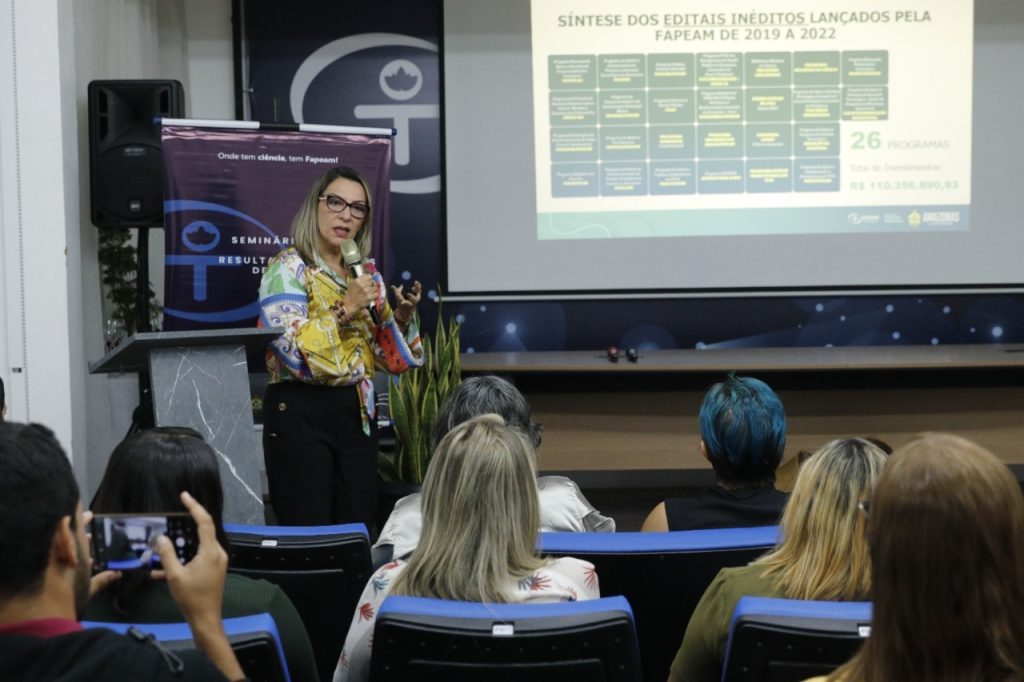by Amazonas Agency
Researchers supported by the Amazonas government are participating in the symposium
The results and impacts of 19 research projects are presented at the third edition of the Fapeam Symposium: Results/Implications of Research, organized by the Amazonas State Research Support Foundation (Fapeam), today and tomorrow (6/12 and 07). The event aims to socialize and disseminate the results of the projects promoted by the Foundation for the economic, social, environmental and scientific development of the country.
Researchers from various educational and research institutions in Amazonas, coordinators of scientific projects, representatives of institutions, guests and other interested parties participate in the symposium.
During the inauguration, the Director of Fapeam, Marcia Perales Mendes Silva, highlighted the support of the state government with an investment of more than R$ 409 million, in the past four years, which has allowed the launch of 89 programs, among them, 26 unpublished, aimed at promoting the field of science, technology and innovation .
Among the unprecedented programmes, Marcia Perales highlighted programs that aim to support research in the interior of the Amazon, such as the Program to Support the Interior in Amazon Research and Technological Innovation (PAINT), programs that aim to encourage the coordination of projects by researchers, namely Works of the Women and Girls in Science movement, as well as those aimed at basic education.
On this occasion, the Director also highlighted the increase in the number of scholarships and grants offered by the Stricto Sensu Postgraduate Support Program (Posgrad), which has resulted in 1,285 master’s and doctoral degrees, supported by exclusive resources from the state treasury.
“This has given Amazonas, since 2020, the first place in the ranking, among Brazilian Research Support Institutions (Faps), in investments in Masters and PhD scholarships with resources from the state government. Given the priorities and guidelines of the state government defined in the multi-year plan ( PPA), we rank first in Brazil.
historical marker
Marcia Perales also revealed the corporate effort and scope of implementation of the full budget for Fapeam, an achievement achieved in 2020 and 2021, which could be repeated in 2022. “The result of this is the sum of teamwork, which requires planning, strategy and competence,” said the director, explaining Science, Technology and Innovation (CT&I) map of all municipalities reached by Fapeam.
Biological collections/museums
Among the projects presented at the symposium, with the support of the Biological Collections / Museums Program (Ed. No. 008/2019), is a study on “Hymenoptera insects (bees, ants and wasps) in the Amazon: the diversity hidden in it”, coordinated by Marcio Luiz de Oliveira , from the National Research Institute of the Amazon (INPA).
The aim of the research was to find out the species diversity of some families of Hymenoptera from the Amazon, already deposited in the Inba group of invertebrates. To this end, five sliding steel coils have been installed, replacing the fixed coils to better regulate the use of the collection, ensuring the expansion of the collection for years to come.
According to the curator, the work of the visiting specialists has left the hymenoptera collection at a level of accuracy that now allows researchers and students who need this information to consult this information with much greater accuracy. In addition, the knowledge gained and expanded can be used in programs and actions to conserve nature and its uses in a more sustainable way.
“The symposium becomes important for presenting the research findings supported by Fapeam to the public. This is the second public notice in which I participate and is essential to improve knowledge, as well as learn about other research,” said Marcio Luiz.
Other studies supported by the Biological Collections Program were also presented this Tuesday, namely: “Computerization of the Plant Germplasm Collection of the Amazon Biotechnology Center (CBA), coordinated by Researcher Simon da Silva, of the CBA; “The Territorial Ecthological Collection of the Federal University of Amazonas: Foundations for its Expansion and Update and the dissemination of science,” coordinated by researcher Kedama Christine Yamamoto, of the Federal University of Amazonas (Ufam).
Strategic Amazon
Seven studies were presented with the support of the Strategic Support Program for the Economic and Environmental Development of the State of Amazonas – Amazonas Strategico, including the project “Continuous use of herds of tambaqui (Colossoma macropomum) and Matrixa (brycon amazonicus): maximum use of matrices and clones of Amazonian species”, by researcher Aldessandro da Costa Amaral, who was representing researcher Fernanda Loureiro de Almeida, study coordinator.
The research seeks to address food security and hunger eradication, as well as multiple use of each matrix, reduce the number of matrixes required in a herd, and increase environmental conservation (sustainability of production).
Aldessandro said it is important for the community to recognize the results achieved with public resources, through the programs offered by Fapeam.
During the symposium, studies on “Conservation and use of the guarana genotype pool in the Amazon”, coordinated by André Luiz Atroch; “Generation and Transfer of Technologies for Pineapple Culture in the Amazonas State, by researcher Marcos Vinicius García; and “Food Management and Water Quality Control Strategies Aiming to Reduce Tambaqui Production Costs in Amazonas State,” coordinated by researcher Johnny Koji Dereke. All from Embrapa.
Researchers from Ufam, Amazonas State University (UEA), INBA, Ariane Mendonca Klochkowski, Hector Collin, and Sonia Alva, respectively, presented the results of the projects “Implementation and Verification of a Protocol to Control Pollution Risks in Prism” – Brazil Nut Harvesting in Industries in the Amazon region “Search for new antitumor substances from filamentous fungi in Amazonas”; and “Co-optimization of camu-camu, peach palm, and Amazon açaí for immediate use in central Amazonia.”
The first two editions of the research symposium brought together 40 researchers supported by various Fapeam programs and a further 19 researchers in the third edition. Science is expected to be popularized by presenting research results and its implications.

“Hardcore beer fanatic. Falls down a lot. Professional coffee fan. Music ninja.”



![[VÍDEO] Elton John’s final show in the UK has the crowd moving](https://www.tupi.fm/wp-content/uploads/2023/06/Elton-John-1-690x600.jpg)


More Stories
The Director of Ibict receives the Coordinator of CESU-PI – Brazilian Institute for Information in Science and Technology
A doctor who spreads fake news about breast cancer is registered with the CRM of Minas
The program offers scholarships to women in the field of science and technology